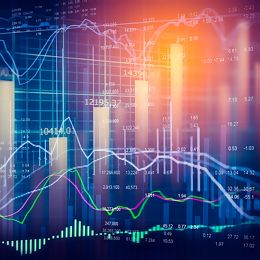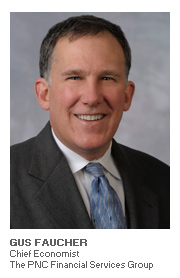
For many American businesses the election of Donald J. Trump represented the promise of a new era in Washington D.C., where prosperity would no longer trickle down from the largest corporate players, but rather bubble up from every corner of the market, with a renewed emphasis on the importance of small- and medium-sized businesses.
Throughout a brutal primary campaign Trump spoke frequently to the American entrepreneur — anchoring many of his principle policy positions (trade, immigration, regulatory and healthcare reform) to how they would benefit workers and small-business owners. He continued to hammer this message home over the summer.
At an August summit on small business held at the White House, Trump doubled down on his commitment to improving conditions for SMBs. Flanked by Linda McMahon, the former CEO of World Wrestling Entertainment, Inc. — who Trump chose to lead his Small Business Administration — the President called small businesses the "Engine of the American Dream."
"America is on the verge of a golden age for small business," the President told approximately 100 small business owners who were invited to attend. “We are ending job-killing regulation, eliminating massive restrictions on American energy, and pursuing bold tax cuts so our companies can thrive, compete and grow. Together, we are unleashing a new era of American prosperity.”
The Trump Effect
Ahead of Trump’s inauguration, most economists expressed enthusiasm about the potential for renewed growth — with nearly three-quarters projecting a “substantial fiscal stimulus” on the horizon, according to a January poll of 60 leading economists conducted by The Wall Street Journal.
But as the months wore on and the President’s economic priorities got sidelined by increasingly tenuous foreign policy entanglements, some of that optimism faded. By the time Trump publicly addressed the small business community in August, barely a quarter of those same economists were still comfortable incorporating a future economic stimulus into their economic forecasts.
That's not for lack of enthusiam, says Gus Faucher, Chief Economist for PNC Financial Services. Faucher says that while businesses remain bullish on the Trump presidency, their optimism isn't showing up in increased capital expenditures (CAPEX).

"While we are are seeing some of the highest levels of business optimism in since the Great Recession according to most polls, businesses are still taking a wait-and-see approach to the Trump administration," said Faucher, in a recent interview with members of the Equipment Finance Advisor staff.
In April, Faucher, a veteran forecaster, replaced Stuart Hoffman as Chief Economist for PNC Financial Services. Hoffman — who had been PNC's chief economist since 1991 — was recognized as one of the most accurate economic and interest rate forecasters in The Wall Street Journal’s monthly economic survey. According to Faucher, while the Trump administration has called for pro-growth policies, such as fewer regulations and increased infrastructure spending, there have been few tangible policies implemented, and little sign of a pickup in business investment.
“There are a couple of tangible factors that support increased confidence now: stronger global economic growth and a recovery in commodity prices, especially energy prices," he said. "But these are secondary to optimism over potential policy changes. At this point what we are seeing is more of an abstract confidence, driven by the sense that there will be substantive policy changes under the Trump administration (reduced regulations, lower taxes, infrastructure spending) that will boost prospects."
Bright Spots
According to Faucher, more infrastructure spending would be a positive for CAPEX, as would recently proposed tax changes that would encourage businesses investment. However, until President Trump irons out his policy agenda business investment will be influenced by larger macro-economic forces.
For instance, energy-producing regions, particularly those that produce oil and natural gas, are benefitting from the stabilization in energy prices. This in turn is supporting production of energy-related manufacturing goods, primarily in the Midwest. Faucher says the strengthening in the U.S. dollar was a drag on domestic CAPEX spending in 2015 and early 2016, but it is has stabilized over the past year. That is helping export-oriented manufacturers of capital goods. Meanwhile, tech-producing regions, concentrated largely on the coasts, are benefitting from replacement of older technology equipment and stronger demand from overseas. There has also been some expansion in the auto industry, benefitting the Midwest and Southeast, and a surge in sales following Hurricanes Harvey and Irma, to replace damaged vehicles. But with sales stabilizing, that driver will fade over the next couple of years.
"Manufacturing is expanding nicely, supported by continued gains in consumer and business spending, stronger global growth, a weaker dollar this year, improving construction, and an improvement in the energy industry with higher energy prices," said Faucher. "That’s obviously a factor for investment in energy as well. Construction is expanding, both commercial and residential, so it makes sense that that segment would be strong. Obviously there’s some uncertainty around healthcare, but demand continues to grow with an aging population and increased access to health insurance. And transportation equipment benefits from solid overall economic growth.
Still Waiting
Regarding Trump's promise to eliminate costly and redundant regulations, Faucher says that while that may have a positive impact on future investment, "it will remain a secondary factor to the overall economic outlook; and if the administration and Congress are unable to implement these policies, then confidence is likely to retreat."
Indeed, President Trump's rocky relationship with some members of his own party mean his hands could be tied on some critical campaign promises — a dynamic that was already on display during heated negotiations over the repeal of Obamacare.
Yet, while Trump may have overpromised on the campaign trail (which is hardly uncommon among presidential candidates) he is in fact inhereting a decade-old problem, the scope of which he may have underestimated. As one commentator put it, the Great Recession was “a meat-cleaver on the economy.” Even a president can't simply will the pieces back together.
Faucher agrees and says that capital spending has been subdued throughout the expansion, driven by factors outside the control of the executive branch.
"The biggest thing to focus on is the capacity utilization rate, which is part of the industrial production data from the Federal Reserve. The economic expansion is now eight years old but the addition of new capacity remains limited," he said. "Without a substantial reduction in excess capacity, growth in CAPEX spending is likely to remain muted.
The capacity utilization rate in the industrial sector was just 76.6 percent in June. That was up from 66.7 percent at the low during the recession in mid-2009, but down from above 80 percent prior to the Great Recession. With lots of excess capacity, businesses are being cautious with their capital spending, Faucher explained, with more investment taking place in areas that have faster depreciation, such as technology. Faucher says there has also been an increase in spending on construction equipment as commercial construction has picked up with low vacancy rates and rising rents for commercial real estate.
A Cautious Fed
Monetary policy is another factor in the CAPEX equation. In 2015 the Federal Reserve raised short-term interest rates for the first time in nearly a decade, and has raised it three times since then, including twice this year. Economists are divided on whether the Fed will raise rates again before the end of the year.
According to Faucher, interest rates will gradually increase over the next few years as the Federal Reserve tightens monetary policy.
"The higher rates will come from increases in the Federal Funds rate, the key short-term rate that the Federal Open Market Committee sets," he said. "The Federal Funds rate is currently in a range of 1.00 to 1.25 percent [and] PNC expects one more increase in the rate this year in December, to 1.25 to 1.50 percent, and three more in 2018, which would take it to a range of 2.00 to 2.25 percent at the end of next year, still well below its long-run average.”
Even within this rising-rate environment, interest rates remain very low on an historical basis thanks to the Fed's cautious approach.Meanwhile, Trump's nominee to replace Janet Yellen as the Fed Chairman — Jerome Powell — has hinted that it's in no mood to shift into higher gear.
“The committee has been patient in raising rates, and that patience has paid dividends,” Powell said in a speech in June. “While the recent performance of the labor market might warrant a faster pace of tightening, inflation has been below target for five years and has moved up only slowly toward 2 percent, which argues for continued patience, especially if that progress slows or stalls.”
Journalist Victoria Guida pointed out the Fed's unenviable conundrum recently for Politico: "The central bank faces a balancing act to avoid becoming the cause of a recession. If it raises interest rates too quickly, without being warranted by strong gross domestic product growth, it could strangle the economy. But if it doesn’t raise rates fast enough, that could spur out-of-control inflation, which would lead the Fed to raise rates even more rapidly — potentially triggering a recession."
Faucher believes that's a foregone conclusion.
"While the likelihood of a recession in 2018 is only about one-in-four, at some point over the next few years the U.S. economy is likely to fall back into recession," Faucher said, "although it will almost surely not be as bad as the Great Recession from December 2007 to June 2009.